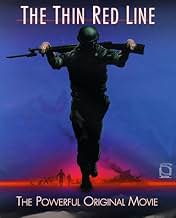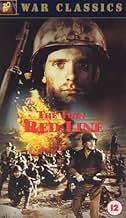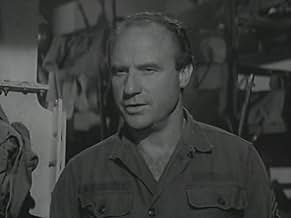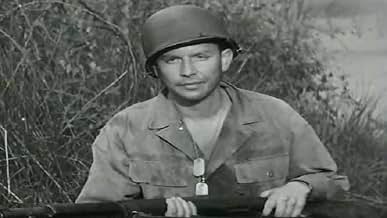IMDb-BEWERTUNG
6,7/10
889
IHRE BEWERTUNG
Füge eine Handlung in deiner Sprache hinzuIn Guadalcanal during World War II, a private and his sergeant clash during the heat of battle with the Japanese.In Guadalcanal during World War II, a private and his sergeant clash during the heat of battle with the Japanese.In Guadalcanal during World War II, a private and his sergeant clash during the heat of battle with the Japanese.
- Regie
- Drehbuch
- Hauptbesetzung
Bob Kanter
- Fife
- (as Robert Kanter)
Jim Gillen
- Capt. Gaff
- (as James Gillen)
Stephen Young
- Stack
- (as Stephen Levy)
Empfohlene Bewertungen
6PKC
A solid effort hampered by the the filmmaking conventions of that time. Some of the acting is amateurish, and the dialogue stilted. But it does confront the serious moral issues of war, unlike most war movies of that era. The theme is essentially the same as the current version -- that is, how does man endure in war? It presents several models for survival. Many of the scenes are exactly the same as in the 1998 version, though it includes others that are not found in Malick. This attempt focuses more on the relationship between Welsh (Jack Warden) and Doll (Keir Dullea). The music is awful, like something out of a cheesy 50s horror flick. Also, it's amazing how much Guadalcanal resembles the high desert of Southern California. But this is well worth a rent if one has the proper expectations...
Like some other commenters, I saw the 1998 version before seeing this version. I had expected a somewhat jingoistic war film, but was surprised that this turned out to be superior to the 1998 remake in every way but one. Of course the one aspect that was lesser was the depiction of graphic violence, and that was only due to the changing times and audience, and modern film effects that can show things more realistically in graphic fashion. However, I do not consider this a positive, but only stating that the technical ability to show graphic violence has improved. I would say that the story in this one is more engaging, more concise and without losing the effect of alienation that both try to convey, and in fact that effect is much more visible here in this depiction. I found the acting to be solid and less melodramatic than the 1998 version, and the soldiers actions all ring true to what would have been going on in WW II at Guadacanal, without hystrionics. It's quite interesting that this version, coming right before the Vietnam era would be cynical about war but also considerably mindful of the necessity of the particular war it depicts and of the need for the soldiers to do as they did. Whereas the post-Vietnam 1998 version is also cynical, yet much more so, showing the military as a bumbling bureaucracy of sorts and attempting to depict the battle as pointless, extending that depiction to the war in general, and it actually is an unstated allegory about Vietnam. I would say that the 1998 film boasts a production group fairly unaware of the overall reality of WW II, and still stuck in the miasma of Vietnam.
Oops, I got this film by accident, I thought it was the 1998 version. After almost taking it back, I decided to watch it and was glad I did. This is really a very good film working on the characters and situations without having to rely on the star appeal or visual effects as modern films. Do yourselves a favour and repeat my mistake.
The first interpretation of James Jones' novel is an OK movie. Nothing really stuck with me, though. It condenses about five characters each into the two lead characters in order to make a well rounded film that fairly expresses Jones' ideas on men in war. It is an interesting psychological study on men, not under stress, but facing death, either from a distance, or up close. There are some great moments in this, and the acting is superb. I did think, though, that the sexual feelings of the novel did not translate so well into the early 60's film. The battle are also utterly unconvincing. Death is still portrayed as a somewhat painless event (with the near exception of one great scene), it leans more to the earlier gung ho war movies than, say, Paths of Glory or All Quiet on the Western Front. The battle scenes are ultimately silly and cartoonish. Two men climb a cliff because the valley below is mined. One knocks over a big rock that causes a chain reaction and all the rocks fall into the valley and clear the mine field. This kind scene is not meant to be surreal, so it loses on the realism scale. This is not the way Jones wanted war depicted. The kind of silly inventiveness of the battle scenes does not exist in all out combat. But, I must say, it does succeed in some scenes, and the performances are all great. I must also say that the end is extremely powerful. It made all the cheesey set pieces and battle scenes disappear from my mind. That last shot is the tone of Jones' novels, a tone From Here to Eternity got right all the way through, and Terrence Malick's Thin Red Line also successfully portrayed (But stepped away to alow contemplation, not to experience.) That last scene makes it a good movie, but it couldn've been done better. Actually, it was done better. I still recommend it. It has its ideas in the right place, but its execution is a bit showy and not realistic enough.
This version of James Jones' book follows the plot of the novel closely and actually received very high praise from the author himself. Jones wrote a letter to the director saying "Very rarely does an author get to write a letter to a filmmaker to say that he has captured the author's intention to the highest level possible." Jones was very pleased with the outcome of this movie, while the 1998 version heavily strays from his book. For example, Witt and Walsh in the 1998 version both quote a lot from another Jones novel, called "From Here To Eternity", and not from "A Thin Red Line". The main storyline, namely the clash between the Private and his Captain, is almost completely left out of the Malick film. In making the book into a movie, the 1964 film succeeds. Which is not to say Malick didn't create a riveting film in 1998, he just didn't really turn the book into a movie.
Wusstest du schon
- WissenswertesThe film's title comes from James Jones's novel and, in turn, from an old saying. In the movie, Captain Stone, played by Ray Daley, says, "I remember an old Midwest saying, 'There's only a thin red line between the sane and the mad.' "
The original 'Thin Red Line' refers to the routing of a Russian cavalry charge by the Sutherland Highlanders 93rd (Highland) Regiment during the Battle of Balaklava on 25 October 1854, during the Crimean War.
- PatzerFor some reason the Japanese soldiers are at times are armed with German Schmeisser SMG's.
- VerbindungenFeatured in The 80th Annual Academy Awards (2008)
Top-Auswahl
Melde dich zum Bewerten an und greife auf die Watchlist für personalisierte Empfehlungen zu.
- How long is The Thin Red Line?Powered by Alexa
Details
- Laufzeit1 Stunde 39 Minuten
- Farbe
- Seitenverhältnis
- 2.35 : 1
Zu dieser Seite beitragen
Bearbeitung vorschlagen oder fehlenden Inhalt hinzufügen

Oberste Lücke
By what name was 7 Tage ohne Gnade (1964) officially released in Canada in English?
Antwort

























